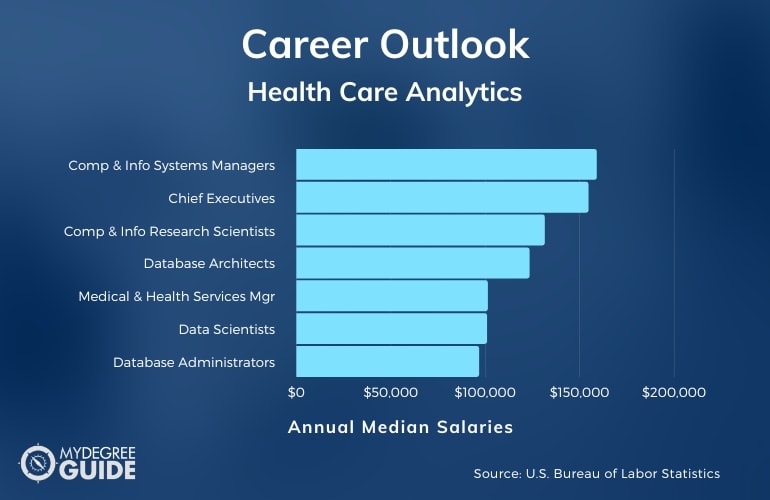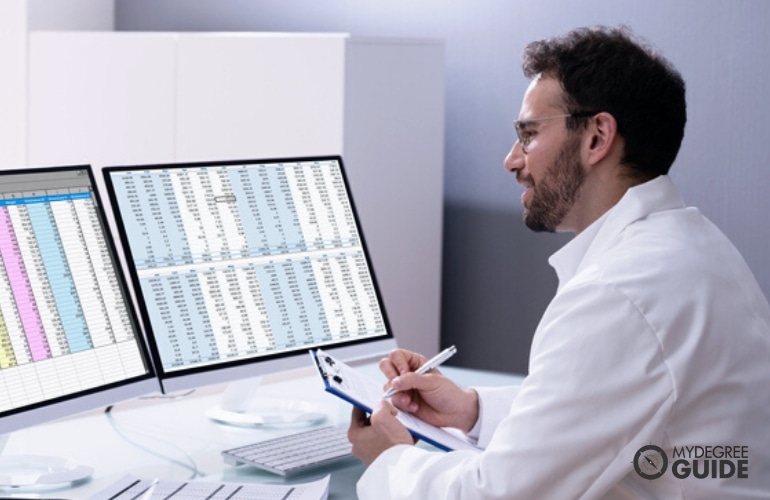If you enjoy analyzing data, a masters in healthcare analytics could help you work toward beginning or advancing a career in the growing healthcare field.

This type of program can teach you how to examine data sets and present your findings, with the goal of helping healthcare organizations function efficiently and safely. Your coursework may cover methods like data mining, forecasting, statistics, and more.
Editorial Listing ShortCode:
Healthcare analytics is a valuable field, as institutions like hospitals and private practices need professionals to help managers make informed, data-driven decisions.
Universities Offering Online Masters in Healthcare Analytics Degree Programs
Methodology: The following school list is in alphabetical order. To be included, a college or university must be regionally accredited and offer degree programs online or in a hybrid format.
1. Averett University
Averett University offers an MS in Applied Healthcare Data Analytics. The program is fully online and designed for working students. To graduate, students must complete 31 credits. Courses are offered in 8 week blocks and typically taken one at a time. Blocks are offered twice a semester in the fall, spring, and summer.
Averett University is accredited by the Southern Association of Colleges and Schools Commission on Colleges.
2. Clarkson University
Clarkson University offers a Master’s in Healthcare Data Analytics. The program is offered entirely online to help students balance work and school. The program requires the completion of 36 credit hours. Students must take 27 credits in core classes and may choose 9 credits of electives. Potential courses include Healthcare Accounting and Finance.
Clarkson University is accredited by the Middle States Commission on Higher Education.
3. Duke University
Duke University’s Fuqua School of Business offers an MSQM in Health Analytics. The program is offered entirely online. Courses have asynchronous components and weekly live virtual meetings. Students must attend a two-day residency at the beginning of the program. The program can potentially be completed in 19 months.
Duke University is accredited by the Southern Association of Colleges and Schools Commission on Colleges.
4. Florida International University
Florida International University offers an MS in Health Informatics and Analytics. The program is entirely online and can potentially be completed in 16 months. The curriculum is designed to help students develop health information management and business skills. Students move through the program in a cohort of 40 students, and they have live meetings with professors. The program starts each fall.
Florida International University is accredited by the Southern Association of Colleges and Schools Commission on Colleges.
5. Iowa State University
Iowa State University offers a Master of Healthcare Analytics and Operations that can be earned fully online. To graduate, students must complete 30 credit hours. The program can potentially be completed in 15 months. Classes are offered in the fall, spring, and summer. Potential courses include Healthcare Supply Chain Management.
Iowa State University is accredited by the Higher Learning Commission.
6. Merrimack College
U.S. News & World Report named Merrimack College the #3 Most Innovative School in the country. Merrimack offers an MS in Healthcare Analytics. The program is fully online, and most courses are asynchronous. Courses are offered in the fall, spring, and summer. Students in the program receive a competency-based education and learn through concepts and experience-based projects.
Merrimack College is accredited by the New England Commission of Higher Education.
7. MGH Institute of Health Professions
The MGH Institute of Health Professions offers an MS in Healthcare Analytics. The program is offered fully online. Students are required to complete 36 credit hours to graduate. The program can potentially be completed in 2 years when taking classes full-time. Potential courses include Analyzing, Visualizing, and Storytelling with Data.
MGH Institute of Health Professions is accredited by the New England Commission of Higher Education.
8. Northwestern University
Northwestern University offers an MS in Health Analytics. The program is fully online. To graduate, students must complete 12 courses and a capstone project. Courses are offered in winter, spring, and fall and follow an asynchronous format. Potential courses include American Healthcare, Digital Health, and Analytics.
Northwestern University is accredited by the Higher Learning Commission.
9. Tufts University
Tufts University offers an MS in Health Informatics and Analytics. The program is offered entirely online. There are synchronous components in some courses. Courses are offered in January, May, and September. Students must also complete a capstone practicum at a local facility. Potential courses include Fundamentals of Privacy and Security in Health IT.
Tufts University is accredited by the New England Association of Schools and Colleges.
10. University of Arkansas for Medical Sciences
The University of Arkansas for Medical Sciences offers an MS in Healthcare Data Analytics. The program includes online courses and blended courses. The program can potentially be finished in 2 years when taken full-time. It requires the completion of 36 credit hours and a capstone or a thesis project.
University of Arkansas for Medical Sciences is accredited by the Higher Learning Commission.
11. University of Denver
U.S. News & World Report named the University of Denver among the Best National Universities. The school offers an MS in Healthcare Informatics and Analytics that can be earned entirely online or during the evenings. To graduate, students must complete 48 credit hours, which can potentially be done in just 18 months. Each course is 10 weeks long.
The University of Denver is accredited by the Higher Learning Commission.
12. University of Louisville
The University of Louisville offers an MS in Health Data Analytics. The program is fully online, and most of the courses are asynchronous. Students may be able to complete the program in just 3 semesters with a full-time course load. The program requires the completion of 33 credit hours and a capstone project.
The University of Louisville is accredited by the Southern Association of Colleges and Schools Commission on Colleges.
13. University of North Carolina – Charlotte
The University of North Carolina—Charlotte offers an MS in Health Informatics and Analytics. Students may choose between two concentrations: Health Services Outcomes or Data Science. Both programs are fully online. Each requires 36 credit hours, and full-time students can potentially graduate in 15 to 18 months.
UNC Charlotte is accredited by the Southern Association of Colleges and Schools.
14. University of South Florida
Value Colleges ranked the University of South Florida as the top college for health informatics programs. The school offers an MSHI in Healthcare Analytics that can be earned fully online. The program requires the completion of 32 credits, and it can potentially be completed in just 2 years. Courses are offered in an 8 week, accelerated format.
The University of South Florida is accredited by the Southern Association of Colleges and Schools Commission on Colleges.
15. University of Texas Rio Grande Valley
The University of Texas Rio Grande Valley offers an MS in Business Analytics with a specialization in Healthcare Analytics that can be earned entirely online. The program requires the completion of 33 credit hours, and it can potentially be finished in just 1 year. Courses are offered in a 7 week, accelerated format.
UTRGV is accredited by the Southern Association of Colleges and Schools Commission on Colleges.
Masters in Healthcare Analytics Online Programs

Healthcare analytics masters programs can help teach skills you can use to pursue a job in healthcare analytics. These graduate programs generally help professionals build upon an already existing analytics career, although they may also assist with a transition into the healthcare field.
Healthcare analytics professionals examine data sets to help organizations improve operations. This might look like cutting costs while maintaining quality of care, increasing operational efficiency, or informing decisions about new technologies. Healthcare analytics covers a wide range of skills, with data analysis at the forefront. It’s also necessary to be able to effectively present your findings.
During your healthcare analytics masters program, you will likely study some of the following topics:
- Data mining
- Statistics
- Data visualization
- Project management
- Healthcare informatics
- Business intelligence
- Accounting
- Data management
Healthcare analytics professionals may work in a range of positions, such as health data analysts, big data scientists, and healthcare analytics consultants. They may also qualify for positions in IT, finance, and insurance. Typically, students pursuing a masters in healthcare analytics have already received a bachelors degree.
After graduating from a masters program, some may choose to work toward industry certifications or even a doctorate in analytics. Experienced professionals may pursue senior or leadership positions in the field. For instance, some work as chief information officers, health information managers, senior data analysts, strategy managers, clinical data managers, and chief population health officers.
Health Care Analytics Careers and Salaries

With a masters in healthcare analytics, you can pursue a variety of job opportunities in the healthcare field. Common career paths include analytics, data management, and research.
Many graduates pursue roles where they can analyze data to draw conclusions about the effectiveness of a program, organization, team, and more. These kinds of jobs can be essential to helping healthcare organizations make strategic planning decisions.
Analytics jobs that graduates may work toward include management analysts, operations research analysts, and clinical data managers. Data management jobs in this field may include database administrators, medical registrars, and computer and information systems managers.
According to the Bureau of Labor Statistics, here are some careers associated with healthcare analytics, along with their median salaries.
| Careers | Annual Median Salaries |
| Computer and Information Systems Managers | $159,010 |
| Chief Executives — Healthcare and Social Assistance | $154,650 |
| Computer and Information Research Scientists | $131,490 |
| Database Architects | $123,430 |
| Medical and Health Services Managers | $101,340 |
| Data Scientists | $100,910 |
| Database Administrators | $96,710 |
| Management Analysts | $93,000 |
| Operations Research Analysts | $82,360 |
| Health Information Technologists and Medical Registrars | $55,560 |
The careers you can qualify for with a masters in healthcare analytics will likely depend on other factors, such as your location, experience, prior education, and skills.
Healthcare analytics careers centered around data analysis typically involve spending most of the day in an office on a computer. Jobs with more of a managerial role, such as health information managers or clinical data managers, may involve more time on your feet or in meetings.
Many of these careers are expected to experience faster than average job growth over the next ten years. For instance, medical and health services managers are projected to grow by 28% over this period of time (Bureau of Labor Statistics). This job category includes health information managers.
Master of Healthcare Analytics Curriculum & Courses

Your curriculum in a healthcare analytics program can vary, but below are a few courses you may take while working toward your masters degree:
- Introduction to Healthcare Analytics: This course teaches the foundations of analytics theories and practical applications in the healthcare field.
- Introduction to Statistical Computing: You’ll learn core principles of how to format, analyze, and display data.
- Legal Aspects of Health Information Management: This class covers laws and regulations that can affect patient records in healthcare organizations.
- Biomedical Foundations for Health Analytics: You’ll learn about various public health issues through a biomedical lens to broaden your medical knowledge.
- Data Mining I: This course focuses on foundational lessons in analyzing and reporting your findings on large sets of data.
- Foundation in Management Information Systems: You’ll learn how to manage data and present your findings in a way that other healthcare professionals can understand.
- Data Security and Electronic Health Records: This class will show you how to use different methods to protect patients’ information, and it will also cover legal requirements around patient confidentiality.
- Public Health in the US: You’ll learn about the current state of public health in America as well as how it’s been handled historically.
- Health Data Visualization: This course teaches you how to present you data analysis findings to others to help make informed decisions.
- E-Healthcare Ethics: You’ll learn about what ethical factors to take into account when making decisions for e-medicine practices.
In addition to courses like these, your healthcare data science program may include opportunities for independent study, internships, and other ways to learn about this subject.
Admissions Requirements

While the admissions requirements for an online masters in healthcare analytics program can vary, here are a few common application criteria:
- Bachelor’s degree
- Personal statement
- GRE or GMAT scores (only required at some schools)
- Letters of recommendation
- Resume
Some schools want applicants to submit undergraduate transcripts, especially if they have a minimum GPA requirement. Some programs also want to see an undergraduate degree in a related major, such as statistics or computer science.
Accreditation

Regional accreditation is a key factor to check for when choosing a school for your healthcare analytics program. This status means that the school has met standards for delivering a high-quality education.
Attending a regionally accredited school may help when looking for jobs after graduation, as potential employers often check for this when looking at your degree. If you’re not sure if the school you’re interested in is regionally accredited, you can visit the US Department of Education’s website to verify a school’s status.
Healthcare Analytics Licensure and Certifications

After completing a masters program in healthcare analytics, you may choose to pursue professional certification to help your resume stand out when looking for jobs.
Here are a few industry certifications related to healthcare analytics:
- Certified Health Data Analyst. This credential’s awarded by the American Health Information Management Association.
- Certified Professional in Healthcare Information and Management Systems. This credential’s awarded by the Healthcare Information and Management System Society.
- Clinical Informatics Certification. This credential’s awarded by the American Board of Preventative Medicine.
Each certification will likely have different eligibility requirements outside of obtaining a masters degree.
Financial Aid and Scholarships

Financial aid can be a valuable resource for graduate students, and there are multiple options available to those who qualify. Direct unsubsidized loans are accessible to qualifying graduate students, and your school will often determine how much assistance you can get.
To receive financial aid, students need to have accepted enrollment or be enrolled in an eligible degree program, among other requirements. You may also be required to continue to progress through your program and meet academic standards to keep your financial aid.
Graduate students may also qualify for Direct PLUS loans, scholarships, grants, and more. To explore your options and apply for federal financial aid, you can visit the Federal Student Aid website. Some employers also have tuition benefits available for workers who want to further their education and professional development.
What Is a Healthcare Data Analytics Masters Degree?

A healthcare data analytics masters degree is a graduate credential that shows students have learned about analyzing, managing, and protecting data in a healthcare environment.
These degrees are designed to teach you how to help healthcare organizations run smoothly and safely. Data analytics is becoming increasingly important in the healthcare field. These professionals can help institutions cut down on costs while improving the quality of patient care.
Some techniques students may learn include data mining, data aggregation, statistics, forecasting algorithms, and much more. You may also learn how to effectively present your findings to other healthcare professionals in order to encourage data-driven decisions.
What Can You Do with a Master’s in Healthcare Analytics Degree?

Graduates with a masters in healthcare analytics tend to pursue data analysis and data management jobs in the healthcare industry. Common job settings include hospitals, private practices, and healthcare centers.
Analytics jobs that fall under the healthcare analytics umbrella include operations research analysts, management analysts, and healthcare data analysts. These professionals may evaluate data sets and present their findings to help inform decisions made by organizations.
Other routes that graduates take include pursuing roles as health information managers, database administrators, healthcare analytics consultants, chief information officers, and clinical data managers.
How Long Does It Take to Get a Masters in Healthcare Data Analytics Online?

The timeframe for graduating from a masters in healthcare data analytics online program can vary depending on your school and program.
For instance, it may take as little as 1 year to finish your degree if you are attending classes full-time in a 36 credit hour program and are also taking courses during the summer. If your program requires a thesis or more credit hours, it will most likely take longer to complete.
Other factors may increase your program length as well, such as enrolling part-time. Most masters programs take 1 to 2 years to complete with full-time enrollment.
What’s the Difference Between a Health Informatics vs. Health Analytics Masters Degree?

There is some overlap between health informatics and health analytics, as they both involve looking at information to help healthcare systems function optimally. There are a few key differences between the two sectors, though.
A health informatics masters degree may focus on:
- Artificial intelligence
- New healthcare technologies
- Integrating technology into patient care
A health analytics masters degree may focus on:
- Data analysis
- Database management
- Forecasting models
Health analytics generally aims to drive data-informed decision making, while health informatics practically applies that information.
Is a Masters in Healthcare Analytics Worth It?

Yes, a masters in healthcare analytics is worth it for many professionals. Overall, the Bureau of Labor Statistics predicts that healthcare professions will grow by 13% over the next ten years. Some roles associated with healthcare analytics are projected to grow much faster than average, such as medical and health services managers, medical registrars, and data scientists.
Healthcare analytics professionals are essential because they help healthcare institutions innovate and operate safely and efficiently. Top executives may rely on the data analysis from these roles in order to make effective decisions for the entire organization. A masters in this field could also help professionals qualify for senior or leadership roles in the field.
Getting Your Masters in Health Analytics Online

A masters degree in healthcare analytics could help you advance your expertise and leadership skills in this essential sector of the healthcare field.
Health analytics roles are important in helping leaders make strategic decisions about how to run healthcare organizations. Healthcare analytics professionals are also needed in other health settings, such as insurance companies and public health organizations. Many accredited schools offer health analytics masters programs online, allowing you more flexibility when pursuing your graduate degree.
If you’re ready to continue your educational and professional journey, you can start exploring accredited universities today to find the masters program in health analytics that’s right for you.
